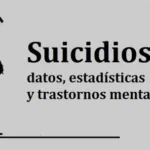It is difficult to think why a friend, family member or loved one has decided to end their life. Whether he manages to commit suicide or remains an attempt, this decision is something that on many occasions was not seen coming and, when it occurs, it raises many questions.
There are not always clear warning signs, so many times, the reason that led a person to commit suicide ends up being an absolute mystery. But one thing must be clear: no one commits suicide just because.
There are several The most common reasons why people attempt suicide and we are going to see them below.
Most common reasons why people attempt suicide
Many people wonder what made a loved one decide to take their own life. Many times the suicide attempt remains just that, an attempt.
But unfortunately, in others the person ends up achieving what they set out to do, sowing a lot of doubts and questions among their family and friends who are trying to understand why it happened. The fact of not seeing it coming causes them great discomfort, feeling guilty and often experiencing survivor’s syndrome.
Many myths about suicide still exist. , despite the fact that there are many prevention campaigns that have attempted to raise awareness about the seriousness of this problem. People who try to kill themselves do so because they are suffering a lot. They believe that it is not worth continuing to live and that whatever is on the other side, if anything, is preferable to the hell they are living. It’s not that they don’t think about their loved ones, or that they want to hurt them, but that they can’t take it anymore.
The main reasons why people attempt suicide are many. Most of them have in common that the person felt hopeless, that there was no light at the end of the tunnel and that they had to end their suffering. Below we will see these reasons why a person decides to end his life.
1. Depression
Depression is, unfortunately, the disorder that causes the most suicide attempts, and also the one that kills the most people. One of the main symptoms of severe depression is the constant feeling of despair, suffering and little hope for the future. Low self-esteem is often a common trait in deeply depressed people, and they feel that they are worthless, that the world would be better off without them.
But although it is the disorder that causes the most suicides, it is, ironically, the one most likely to be improved with treatment. Depression cannot be cured by magic, but a person’s life can be greatly improved by going to a psychologist and, if necessary, taking medication. This is why it is so essential to insist on going to this type of professional if you suspect that a family member, friend or acquaintance suffers from this disorder. There are many possibilities to prevent his suicide.
2. Schizophrenia and psychotic break
Many people with schizophrenia or who are suffering from a psychotic disorder end up committing suicide. Auditory hallucinations can present themselves in the form of voices, which can make comments to the affected person that are not positive at all. They may encourage you to harm yourself and end your life. The reasons given by these voices do not have to be rational, but the patient sees some kind of sense in them.
Unlike depression, psychosis and schizophrenia are more difficult to mask, which is, in a way, positive since a patient with these problems makes the need for professional help more obvious. The negative thing about these disorders is that they are more tragic, in the sense that they are more difficult to treat and the need for drugs is extreme.
3. Alcohol, drugs and impulsivity
Alcohol and substance use can influence a person’s decision to take their own life. It is possible that he already has suicidal ideation while sober, but that they are simple fantasies or imagining what would happen if he left the world. Nevertheless, When you have been intoxicated or are experiencing a drug high, you become more disinhibited. and within that greater disinhibition is trying to carry out those suicidal fantasies.
On the other hand, there is impulsivity as a personality trait. There are people who, being very upset, have all kinds of thoughts going through their heads, including suicidal thoughts. Whether because of the heat of the moment or because they had been thinking about it for a long time, they try to commit suicide and, unfortunately, sometimes they succeed.
If they don’t succeed, both for people who have taken drugs and those who are more impulsive, when they are less upset they feel deep remorse for even having thought about it. They begin to empathize with their family and friends, and understand the damage that could have been done to them.
4. Request for help
On many occasions the suicide attempt is a request for help. The person does not want to die, but She feels that if she does not attract attention in this way, her close circle will not take her seriously. It should be said that the people who usually resort to this route are usually adolescents, who lack the means and maturity to express their problems, or people who have difficulty making known all the suffering they are experiencing, but who effectively want to stop. To feel.
Unfortunately, there are many times when these suicide attempts become a completed suicide, especially due to misinformation about the parasuicide. It is common for those who attempt suicide as a request for help to consume a pill, resulting in an overdose. They think that they will attract attention, they will take them to the emergency room and there they will have their stomach pumped and they will be out of danger. The problem is that taking too many pills can seriously damage the liver and kidneys, leading to fatal effects.
5. Terminal illness
The decision to die by suicide can be highly rationalized, in the sense that the person really wants to die not because they have a mental disorder or feel bad psychologically, but because they suffer from a terminal illness. His life is being shortened due to an incurable disease, a medical condition that no matter how many drugs he takes, how many operations he undergoes or what diet he follows: he cannot control it. Deciding when to die is the only thing they can control, and they don’t want the disease to take it away from them.
It should be said, however, that not all chronic diseases are equally disabling or disruptive in the life of the affected person, but there are many that correlate with a higher risk of suicide. It has been seen that chronic diseases that we could consider “mild”, such as asthma, back pain, high blood pressure and migraines can be a cause of suicide almost as much as terminal cancer, brain damage, highly disabling heart problems, last phase of HIV/AIDS disease, Parkinson’s disease.
This suicidal motivation is what has caused several countries such as Belgium, Luxembourg, the Netherlands, Canada and Colombia to legalize euthanasia. The justification for allowing assisted suicide in some cases is that, since The person will not be able to enjoy the few years they have left and will live them with great suffering it cannot be considered human to allow him to die in an undignified manner or to decide to take his own life in a way that is especially traumatic for those around him.
6. Not wanting to be a burden
This is a common reason in people who suffer from a chronic illness, especially when they have to be cared for by family members. As the disease becomes more incapacitating, the more they depend on their family members. and sometimes they feel that they are a burden and that it would be best to leave the world now.
They want to die because they feel terribly guilty for taking the lives of people who are healthy and who could enjoy their lives if they were not still alive. When they are still mobile, these types of patients try to end their lives before they cannot do it themselves.
7. Fear of failure
In a society in which social pressures can be truly intense, the fear of failure and what people will say becomes a very serious psychological problem.
There are many people who consider that not leading a perfect life, according to their own ideals, is synonymous with being worthless. Whether it’s walking away from their idealized life or having a bad streak, many decide to end their lives. Some examples of reasons why a person has committed suicide due to fear of failure are:
8. Traumatic stress
People who have suffered a highly traumatic experience, such as sexual abuse, rape, physical abuse, or trauma from witnessing war, have a higher risk of suicide, even if many years have passed since the traumatic event.
Being diagnosed with Post-Traumatic Stress Disorder (PTSD) or having experienced multiple traumatic events further increases the risk of succudity. Furthermore, depression is usually a symptom that appears in these conditions, making the risk even greater. Among the common symptoms of PTSD we have feelings of despair and the feeling that no one can help them, which are a real time bomb that leads to suicide.
9. Social isolation
Social isolation is a serious problem and can be the cause of suicide. There are many reasons that have led a person to feel alone: breakup with a partner, divorce, loss of family or friends, social anxiety, mental disorder, illness, retirement, family abandonment… All of them They make the person feel less and less motivated to continue living and end up making the decision to end it all.
But social isolation cannot only be a cause of suicide. It can also be behind the appearance of mental disorders, substance addiction and alcoholism. This is why, especially in older people, contact should continue to be maintained with family members who are known to be spending too much time alone, in order to prevent them from committing suicide attempts and help them seek help. necessary professional.









